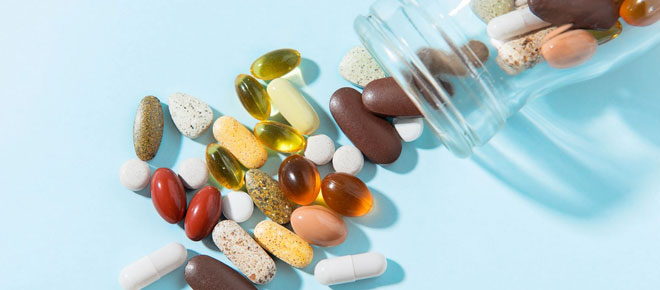Discover the Top Vitamins Supplements You Should Be Taking

Discover the Top Vitamins Supplements You Should Be Taking is a guide to help you improve your overall health and wellbeing by providing information on the most essential vitamins and supplements to include in your daily routine. This informative guide will help you understand the benefits of each supplement and how they can work together to support your immune system, promote healthy aging, and boost your energy levels.
Vitamin D
Vitamin D, commonly known as calciferol, is a fat-soluble, important vitamin. It is found naturally in a few foods, added to others, and available as a dietary supplement. It is produced endogenously when ultraviolet (UV) rays from sunlight strike the skin, triggering vitamin D synthesis.
It is best known for promoting bone health, but research suggests vitamin D may help protect against many other diseases. These include heart disease, cancer, depression, multiple sclerosis, and type 2 diabetes.
Everyone should consider taking a vitamin D supplement, especially during the autumn and winter when it is hard to get enough UV light to make vitamin D. It is recommended to choose a vitamin D supplement that contains active forms of the vitamin such as ergocalciferol or cholecalciferol. It is also often included in multivitamin supplements. When looking for vitamin D supplements or other supplements, you can explore Vitamins & Supplements Promo Codes to potentially get discounts on these products.
Vitamin C
Vitamin C, also known as ascorbic acid, is a water-soluble vitamin that promotes healthy tissue growth. It also helps your body absorb iron and may reduce your risk of getting the common cold. A double Nobel laureate named Linus Pauling popularized the idea of loading up on vitamin C to prevent and treat a variety of diseases, including the common cold. But, while vitamin C can help shorten the duration of a cold, it does not prevent them (36).
Some studies show that it can lower the risk of cataracts and slow the progression of age-related macular degeneration, but more research is needed (6). Other studies have shown that taking vitamin C supplements can lower blood pressure in people with and without high blood pressure (7). It can also improve heart health by lowering levels of triglycerides and LDL cholesterol (8,9).
Vitamin E
Vitamin E is an antioxidant that neutralizes free radicals—harmful molecules linked to oxidative stress and disease. It's also a natural anti-inflammatory and helps slow aging. It's found in foods like almonds, vegetable oils (like olive or sunflower), green vegetables, spinach and fortified cereals. The form that's best known for its health benefits is alpha-tocopherol, but there are other forms such as delta and gamma tocotrienols that have specific protective properties against heart disease.
Large observational studies and some clinical trials have found that vitamin E reduces risk for heart disease by lowering blood pressure, dilating blood vessels and helping prevent blood clots. However, the HOPE-TOO study of healthy people showed that taking 400 IU/day of vitamin E didn't reduce the number of heart attacks, strokes or deaths in these participants. (2)
Vitamin K
Vitamin K, also known as coagulation vitamin (from the Danish and German word koagulationsvitamin), helps your body form blood clots to stop bleeding when you are injured. It also helps with bone health.
It is found in two forms in the diet: phylloquinone (K1) from leafy greens, and menaquinones (MKs) from fermented foods, animal products, and gut bacteria. Phylloquinone is better absorbed when consumed with fat (as in the case of consuming a meal containing green vegetables with oil), but absorption of long-chain MKs remains low.
In a large prospective study of heart disease and stroke risk factors, higher intakes of phylloquinone and MK2 were inversely associated with hospitalizations for atherosclerotic cardiovascular diseases in older adults. This suggests that these vitamins may act together as markers of a heart-healthy diet. (14)
Vitamin B
The B vitamins are a group of 8 water-soluble nutrients, including thiamine (B1), riboflavin (B2), niacin (B3), pantothenic acid (B5), vitamin B6, pyridoxine (B7), biotin (B9) and folic acid or cobalamins (B12). These are necessary to drive the chemical reactions that produce energy from carbohydrates, fat and protein.
They also help the body metabolize proteins and absorb iron, says Abbott registered dietitian Abby Sauer. But these nutrients cannot be stored in the body, so they must be consumed regularly. If you're interested in maintaining your nutrient intake, you can explore Healthy Life Coupon Code to potentially save on these essential products for a healthy life.
A deficiency can lead to a variety of symptoms including fatigue, weakness and anemia. The good news is that you can get the recommended amount of most B vitamins through a varied diet, especially with meatless options like beans and nuts. However, those who follow a strict plant-based diet may need to supplement their intake with a vitamin B complex.
Vitamin B12
Vitamin B12 is an essential organic substance that the body requires to function properly. It is found naturally in foods, especially animal products, and it is also added to many foods and dietary supplements. This vitamin helps to keep the brain and blood cells healthy, and it is used in protein production.
The best sources of vitamin B12 include liver, meats, fish and dairy products. It is also available in a multivitamin, as well as in methylcobalamin and cyanocobalamin supplements.
A vitamin B12 deficiency can cause neurological symptoms and anemia. It is important to get enough of this nutrient, and it is recommended to see your doctor if you are concerned about a deficiency. Symptoms are generally easy to diagnose and treat. Medications such as metformin and proton pump inhibitors (used to treat diabetes) can reduce the absorption of this vitamin.
Folate
Folate (vitamin B9) is important in cell formation and blood health. It also plays a role in the production of neurotransmitters. Folate deficiency can cause anemia, and taking folic acid supplements can help alleviate it. If you're considering purchasing folic acid supplements or other related products, you can explore All Over Promotional Code to potentially get discounts on these essential supplements.
The synthetic version of vitamin B9 is folic acid. It’s found in many dietary supplements and in fortified foods. It’s recommended that pregnant women take folic acid before and during pregnancy to prevent neural tube defects in the brain and spine such as anencephaly and spina bifida.
Studies suggest that folate can reduce the risk of Alzheimer’s disease. In fact, taking 2,500 mcg of folate per day reduced the risk in one study by 40%. Our methylated form of folate (vitamin B9) is non-GMO, vegan, gluten-free, dairy-free and kosher. It is very easy on the digestive tract. It is absorbed more easily than other forms of folate and can be used in combination with other B complex vitamins.
Biotin
Biotin is a water-soluble vitamin sometimes called “Vitamin B7.” It is found in many foods, including meats, fish, nuts, seeds, eggs and some vegetables. Studies have shown that it can help decrease alopecia (hair loss) and brittle nails, as well as support metabolism and glucose tolerance.
Fortunately, deficiency in this vitamin is rare since it is found in a variety of foods and is produced by your gut bacteria. However, those who follow restrictive diets or take long-term antiseizure drugs may be at risk for deficiency and should consider taking a daily biotin supplement. Biotin supplements are safe and have no known toxicity symptoms, although high doses of this vitamin can interfere with some laboratory tests for thyroid hormones. This can lead to false results and inaccurate diagnosis or treatment.
Vitamin B6
Vitamin B6 is also known as pyridoxine, and it helps support immune function, the transportation of oxygen in the blood and the creation of neurotransmitters. It’s a water-soluble vitamin that dissolves in water and can be found naturally in foods such as chick peas, tuna, tofu, beef liver and spinach.
The FDA recommends 1.7 milligrams of this vitamin per day. It is part of a group of vitamins called the “B complex” vitamins that work together to turn carbohydrates, fats and proteins into energy.
Research shows that B6 can help reduce high homocysteine levels, which can narrow arteries and increase your risk of heart disease. A randomized trial of 158 healthy adults that took vitamin B6 along with folic acid showed lower homocysteine and less damage to blood vessels than a similar group that only received folic acid (28).) (29, 30)
Vitamin B1
Thiamin, or Vitamin B1, is a water-soluble vitamin that helps your body turn food into energy. It also helps keep your nervous system healthy. You can get thiamin from foods such as liver, eggs, whole grains, brewer's yeast, and blackstrap molasses. It is also available as a dietary supplement.
The body needs 13 vitamins to function properly. But some people may need more than others. These include women who are pregnant or breastfeeding, people who drink excess alcohol, and elderly people.
Certain conditions can lead to vitamin deficiencies, including hepatitis C and fibromyalgia. In one study, thiamin (Vitamin B1) supplements improved symptoms of fibromyalgia in patients who had low levels of this vitamin. It has also been shown to relieve hepatitis B symptoms. It's important to eat a balanced diet that includes lots of healthy foods.
Conclusion
Taking vitamins and supplements can be a great way to support and maintain your overall health. However, it is important to choose the right ones for your individual needs and to always consult with a healthcare professional before starting any new supplement regimen. By doing so, you can ensure that you are getting the most benefit from these powerful natural remedies.








